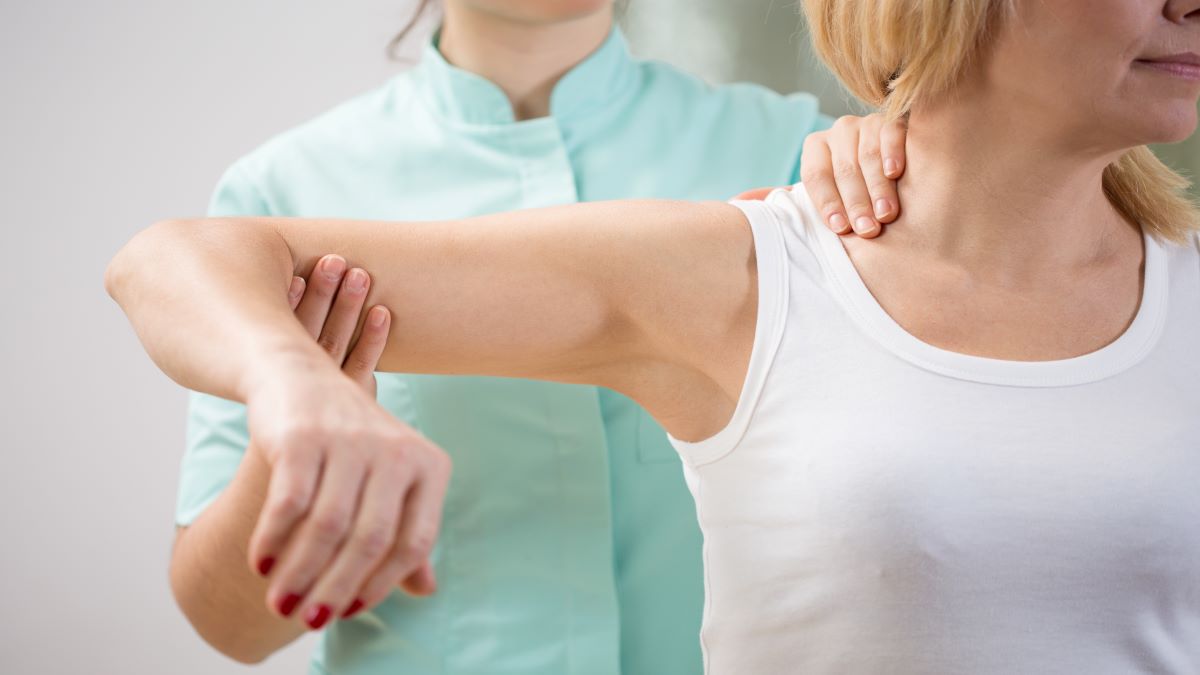A musculoskeletal refers to a condition or pain in a structure that helps support the neck, back, or limbs. It can affect the following:
- Joints
- Muscles
- Ligaments
- Tendons
- Nerves
Musculoskeletal disorders are inflammatory and degenerative diseases. They impair a person’s ability to perform their usual activities due to the symptoms they cause. Many different parts of the body can be affected by musculoskeletal disorders, including the following:
- Lower and upper back
- Neck and shoulders
- Extremities
- Arms
- Hands
- Legs
- Feet
Some musculoskeletal disorders result from repetitive stress and strain, and others occur due to sudden injury or exertion. Examples of common musculoskeletal disorders include tendinitis, carpal tunnel syndrome, and neck pain. Broken bones and injuries sustained due to sudden and forceful contact with an external object are not considered musculoskeletal disorders.
Workplace musculoskeletal disorders are common and occur in many types of occupations. For example, construction workers are often affected and those employed in professions like office work and nursing. Musculoskeletal disorders are among the highest leading causes of disability and early retirement in the United States. In addition, they are one of the top health complaints made by workers in the United States and Europe.
Musculoskeletal pain causes
Musculoskeletal pain can occur for a variety of reasons. The exact cause depends on your:
- Age
- Lifestyle
- Occupation
- Level of physical activity
Over time, certain kinds of activities cause wear and tear damage to the body’s tissues, leading to musculoskeletal pain and disorders. Just like repetitive training for certain sports can cause wearing down in specific body parts, sitting in the same position every day can do the same. Unhealthy posture can make the degenerative effects of sedentary and repetitive activities even worse.
According to the United States Bureau of Labor Statistics in 2015, the following professions are at the highest risk for job-related musculoskeletal disorders:
- Registered nurses, psychiatric aides, and nursing assistants
- Firefighters and fire prevention workers
- Laborers and freight, material and stock movers
- Cleaners and janitors
- Tractor-trailer and heavy truck drivers
- Recyclable and refuse material collectors
- Order fillers and stock clerks
- Housekeepers and maids
- Light truck drivers or delivery service drivers
- Telecommunications line repairers or installers
- Transit and intercity bus drivers
- Production workers
- Sheriff and police patrol officers
- Refrigeration, heating, and air conditioning mechanics and installers
- Steamfitters, pipefitters, and plumbers
- General maintenance and repair workers
The risk of musculoskeletal pain increases with age. It is why many people believe that aging causes disorders of the musculoskeletal system. It is true that joints, bones, and muscles naturally break down as aging occurs, but growing older does not mean that pain has to happen. People affected by musculoskeletal pain in the low back typically start experiencing symptoms in their 30s or 40s. Taking care of your body when you are a young adult and making proactive choices related to your health can significantly decrease your risk of musculoskeletal pain as you age.
Musculoskeletal pain symptoms
Musculoskeletal pain symptoms vary based on the pain location.
- Bone pain may appear dull, stabbing, sharp, or unbearable. Generally, this type of pain causes more discomfort than that in tendons or muscles.
- Muscle pain can be intense and brief if a cramp or powerful muscle contraction (commonly called a charley horse) causes it. The muscle may twitch or contract uncomfortably.
- Tendon pain might appear as a sharp feeling if it results from an injury. Moving or stretching the affected tendon often worsens the pain. Alternatively, the condition improves with rest.
- Joint pain is often described as aching. Stiffness and swelling may accompany this type of pain.
- Fibromyalgia results in numerous tender points throughout the body.
- Nerve compression pain may feel like tingling, pins, and needles or appear as a burning sensation. Other symptoms depend on the pain cause and can include:
- swelling
- bruising
- stiffness
- weakness
- muscle spasms or twitches
- redness
- popping or cracking sounds in the joints
- soreness
- difficulties moving the affected area
- fatigue
- problems sleeping
Musculoskeletal pain complications
Possible complications of musculoskeletal disorders, especially those that result in chronic pain, may include:
- Depression: Depression is a possible complication of musculoskeletal pain if the pain and other symptoms of the musculoskeletal disorder interfere significantly with the person’s lifestyle. If an individual with musculoskeletal pain experiences the following for longer than two weeks, they should notify their healthcare provider:
- Feelings of sadness
- Loss of pleasure
- Low self-esteem
- Problems with daily functioning
- Apathy
- Joint damage: Severe joint damage is a potential complication of musculoskeletal disorders. In these cases, the patient may need surgery to replace damaged joints. If you have ongoing musculoskeletal pain, see your doctor regularly to monitor your condition.
- Loss of mobility: People who have musculoskeletal pain often cannot move as freely as people who do not have pain.
If you have persistent musculoskeletal pain, or if you have been injured, see your healthcare provider. Your doctor will be able to identify the source of your pain and help you decide on the most appropriate treatment to prevent complications of musculoskeletal pain.
Sources:
















Leave a Reply
You must be logged in to post a comment.